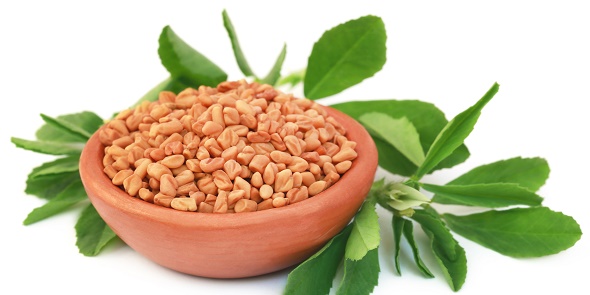Fenugreek is a herbaceous plant used as a spice, belonging to the legume group, usually sold as dried ripe golden to yellow seeds.
Its lush green leaves can be exploited in many traditional folk remedies, and the original fenugreek is native to Asia and Southeast Europe, and it is famous for its cultivation in India, North Africa and the Eastern Mediterranean countries.
Fenugreek has always been known and used to treat many medical problems, and currently it has many uses in the world of medicine, health and others, but so far there is not enough evidence about its effectiveness.
Health Benefits of Fenugreek
Benefits of fenugreek for diabetes
It has been found that one of the benefits of fenugreek is to help control blood sugar levels in diabetics, and this may be due to the role of fenugreek in improving insulin function, and reducing the absorption of sugar from the intestine. This is not the only benefit of fenugreek in terms of diabetes, as fenugreek has also been found to help reduce the incidence of diabetes.
In a 2015 study of 140 people with prediabetes, which lasted for three years, it was found that people who consumed 10 grams of fenugreek powder a day had a 4.2-fold lower chance of developing diabetes compared to those who did not eat fenugreek.
Promote heart health and regulate cholesterol
Fenugreek has the ability to reduce cholesterol in the body, as a group of studies have found that it may indeed contribute to this, with the need for more studies to confirm the mechanism of action of fenugreek in it.
A recent study showed that eating fenugreek reduces bad cholesterol (LDL) and triglycerides, and increases good cholesterol (HDL), and therefore is an important plant to improve the level of fat in the body.
Fenugreek is a source of a number of minerals important for the work of the heart and maintaining blood pressure, such as: potassium, which is an important element to maintain heart rate, control blood pressure, and maintain fluid balance in the body, and fenugreek contains iron, which is necessary for the production of red blood cells.
Promote digestive health
Taking fenugreek may help promote the functioning of the digestive system, prevent stomach upsets and some problems, such as: constipation, indigestion, and bloating.
Thanks to its high content of dietary fiber, and polysaccharides such as: pectin and tannin, which accelerate and facilitate bowel movement, and increase the absorption of nutrients in the body.
These substances bind toxins in food, protect the colon and digestive system from disorders, and prevent gastrointestinal cancers.
Getting rid of inflammation
Thanks to the content of fenugreek of antioxidants, such as vitamin C and vitamin A, it has been found that fenugreek may help prevent cancers and tumors, and also contains a range of different anti-inflammatory properties in the body, but more studies are needed to prove this.
Relieve heartburn
Eating certain fenugreek products before meals has been shown to reduce the symptoms of acidity and heartburn.
According to a 2010 study published in the Journal of Phytotherapy Research, it was found that people suffering from refined heartburn, who took fenugreek in the form of a dietary supplement twice a day and for two weeks 30 minutes before a meal, helped relieve heartburn symptoms and combat acidity, and thus the researchers concluded that this was due to the nature of the fiber contained in fenugreek.
Weight Loss Assistance
Some research has shown that fenugreek seed extracts may help reduce the amount of fat on a daily basis in men who suffer from obesity and excess weight, in addition to the high content of fenugreek soluble fiber that gives you a longer period of satiety, but this feature needs more evidence and proof.
The benefits of fenugreek for the skin

Fenugreek is one of the natural and safe options that can be used to increase the softness and freshness of the skin, among the benefits of fenugreek for the skin:
1 Moisturizing the skin.
2 Improve skin smoothness and texture.
3 Improving skin elasticity, as it contains potassium, carotene, and vitamin C.
4 Treatment of acne and blackheads.
5 Open the pores of the skin, because it contains salicylic acid.
6 Accelerate the treatment of open wounds and burns.
7 Treatment of eczema.
8 Combat signs of skin aging, such as wrinkles, fine lines, and melasma, as it is rich in vitamin B3, which helps repair and regenerate damaged skin cells.
9 It acts as an exfoliator and removes dead skin, thus helping to achieve a radiant complexion.
10 It works to get rid of oils that are secreted from the pores of the skin.
The benefits of fenugreek for hair

Fenugreek seeds and leaves contain many nutrients that play an important role in stimulating hair growth, the most important of which are iron and protein, and they also contain flavonoids and saponins, which are believed to increase hair growth due to their anti-inflammatory and antifungal properties. Read more benefits of Ashwagandha .
Among the benefits of fenugreek for hair are the following:
1 Hair loss treatment.
2 Treatment of baldness.
3 Increase the density of thinning hair.
4 Treatment of dandruff, due to its anti-inflammatory, antibacterial, and antifungal properties.
5 Treatment of dryness and itching of the scalp.
6 Give hair a natural shine, since it contains large amounts of lecithin.
Benefits of fenugreek for men
One of the benefits of fenugreek for men is mainly by helping it increase and improve testosterone levels in the blood, which helps in:
Increased libido.
Improve sexual performance and erection.
Increased sperm count.
Improve physical activity and endurance in athletes.
Improve mood and mental alertness.
Benefits of fenugreek for women
The benefits of fenugreek for women include:
1 Benefits of fenugreek for milk production: It has been found that eating fenugreek increases milk production in breastfeeding breasts, and it also helps increase its flow out of the breast.
2 Benefits of fenugreek for the treatment of polycystic ovaries, as taking fenugreek helps reduce the symptoms of polycystic ovary syndrome, including irregular periods.
3 Fenugreek benefits for the menstrual cycle, as it helps reduce the symptoms of premenstrual syndrome, including painful cramps.
4 The benefits of fenugreek for menopause, as it helps reduce hot flashes and mood changes in menopausal women.
5 The benefits of fenugreek for childbirth, it reduces labor pain significantly, and also makes the process of delivering a baby easier by stimulating uterine muscle contractions.
6 Benefits of fenugreek for breast augmentation: This is because it contains compounds that have an effect such as phytoestrogen.
Disadvantages of eating fenugreek
The damage of fenugreek lies in causing a number of side effects, especially when consumed in large quantities, and these side effects include:
1 Diarrhea.
2 Stomach upsets.
3 Dizziness.
4 Headaches.
5 Changes in the smell of urine, sweat or breast milk
Nutritional value of fenugreek plant
The health benefits of fenugreek are due to its many nutrients that contribute to maintaining the health of the body and make it a good food choice, as one tablespoon of its seeds contains the following:
| Carbohydrates | 6 g |
| Proteins | 3 g |
| Fat | 1 g |
| Fiber | 3 g |
| Iron | 3.7 mg |
| Calcium | 21 mg |
| Magnesium | 21 mg |
| Sodium | 6 mg |
| Phosphorus | 33 mg |
| Vitamin B6 | 0.06 mg |
